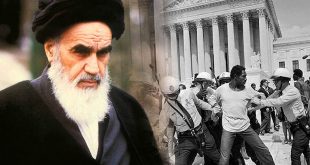They’re not the sort of couple one is likely to encounter in many parts of the country: a hijab-wearing Muslim woman with a Harvard law degree and a white Lutheran pastor.
Yet dozens of Washington state residents — in urban centers and in small rural towns — have witnessed Aneelah Afzali and Rev. Terry Kyllo preach together in churches. Turns out, Afzali and Kyllo have one profound thing in common: a passion to fight against Islamophobia.
Although the duo has held an event in Seattle, Afzali and Kyllo have generally reserved their sermons for smaller, more conservative towns filled with voters who support Donald Trump and who may have never personally met a Muslim. Towns like Mt. Vernon, with a population of 35,000. Situated just 60 miles north of Seattle, Mt. Vernon is the largest city in Skagit County. In last year’s presidential election, Hillary Clinton beat Donald Trump by fewer than 2,000 votes in the county.
On a recent Monday evening in Mt. Vernon, at St. Paul’s Episcopal Church, Afzali addressed a small crowd. She was dressed in a purple suit and hijab, and she was flanked by American flags and a Christian cross. As wind and rain pounded the chapel’s windows, she shared what had inspired her and Kyllo to organize the talks, which they’ve dubbed the “Faith Over Fear Roadshow.”
“I am so extremely bothered by what I see happening around us today, the growing divisiveness, polarization, hate and even violence,” Afzali said.
Afzali then expounded on what she believes Christians and Muslims have in common. Take, for example, the central figure in Christianity — Jesus — who frequently appears in the Quran and who both Christians and Muslims revere as the messiah.
“We have so much else in common with our Christian sisters and brothers, but unfortunately there’s an entire industry that is trying to spread misinformation about Islam and Muslims in our country in order to divide us,” Afzali said.
The “overwhelming majority are just trying to live their lives and do good as the Quran commands.”
“Violence and evil, it has no unique religion,” Afzali concluded.
Since September, Afzali and Kyllo have presided over 11 talks around Washington. The town halls are designed to not only do away with misconceptions about Islam but introduce the public to what they, and others, refer to as the multimillion-dollar Islamophobia industry, which, according to a flier distributed at the Mt. Vernon event, aims to “make Americans afraid of Muslims and Islam.”
The Center for American Progress, a public policy research and advocacy group based in Washington D.C., describes the industry as a well-funded network of organizations that “peddle hate and fear of Muslims and Islam in the form of books, videos, reports, and websites.” Afzali and Kyllo are also in the midst of planning a tour of central and eastern Washington, which is slated to begin early next year. And next month they will lead a training for local religious leaders who want to help fight against discrimination and pass on what they learn about Islam to the faithful sitting in their pews.
The Faith Over Fear Roadshow is filled with simple — some might say even obvious — information. For example, Afzali points out that among the approximately 1.8 billion Muslims in the world, differences exist. The difference is that most Americans are familiar with Christianity, and can, therefore, make a distinction between, say, a mass killer like Dylann Roof — who according to reports attended church regularly— and other religious people they know. This isn’t necessarily the case when Muslims are involved. Muslims only make up about 1 percent of the U.S. population.
Ignorance about Islam and discrimination against Muslims thrives in the U.S. Last month, for example, Trump made headlines by sharing inflammatory videos that purported to show Muslims committing acts of violence.
Of the more than 6,100 hate crimes across the country last year, 307 of those crimes were against Muslims, up from 257 in 2015. The Southern Poverty Law Center also reports “anti-Muslim hate groups,” such as ACT for America, have dramatically increased in recent years, jumping from 34 in 2015 to 101 in 2016.
In June, across the country, Act for America held a “March Against Sharia.” In October, anti-Muslim graffiti was found in a girls’ bathroom at Kent-Meridian High School. In May, a man screamed anti-Muslim insults at two teenage girls on a Portland train before fatally stabbing two men who had attempted to intervene.
Anti-Muslim violence was on the rise, however, well before Donald Trump took office — “and it goes well, well beyond him as well,” Afzali said. “This is not something that we can sort of point to one person or blame one person for.” She can name numerous incidents of violence against Muslims before his tenure. For example, the 15-year-old teen in Missouri who in 2014 was deliberately run over by a driver with a history of anti-Muslim views in front of a mosque.
Afzali is 40 and describes herself as a recovering attorney. Raised in the Bay Area and in Portland, Afzali said growing up Muslim allowed her and her five siblings to embrace Islamic values such as honesty, compassion and education. The first in the family to graduate from college, Afzali went on to study at Harvard Law school but ultimately chose a different career path. Named by Seattle Magazine as one of the most influential Seattleites of 2017, Afzali now serves as executive director of the Muslim Association of Puget Sound’s newly launched American Muslim Empowerment Network (MAPS-AMEN).
source:crosscut
 Ijtihad Network Being Wise and Faithful Muslim in the Contemporary World
Ijtihad Network Being Wise and Faithful Muslim in the Contemporary World
